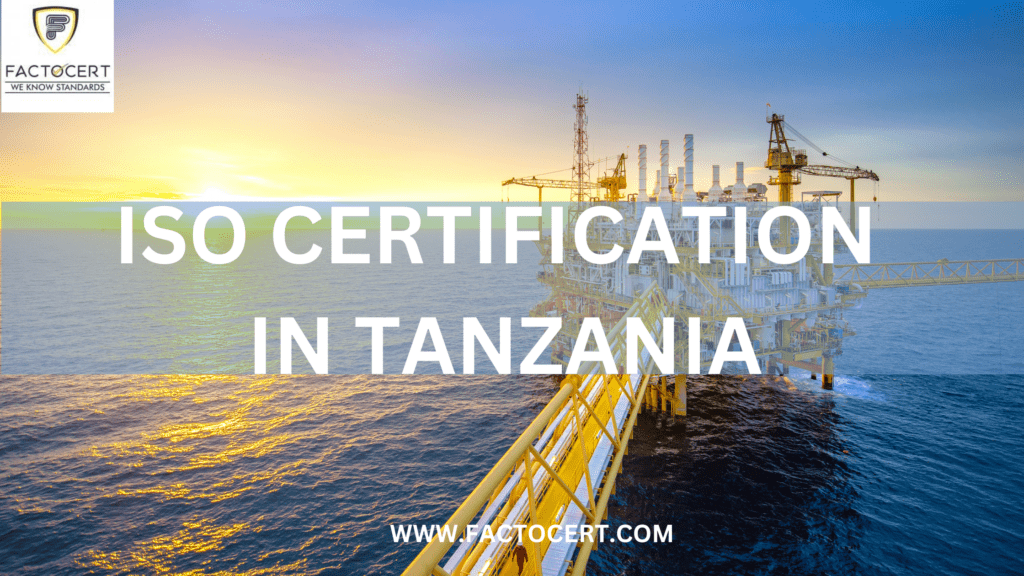ISO Certification in Tanzania, ISO Certification is essential in Tanzania’s economic climate because it provides a consistent framework for businesses to excel across various disciplines and helps to signify a commitment to our commitments to excellence, environmental stewardship, and workplace health and safety. In a diverse and rapidly growing economy like Tanzania’s, ISO certifications are essential for enhancing competitiveness, meeting regulatory obligations, and building stakeholder trust. This introduction underlines the usefulness of ISO certification as a driving force for improved business practices and sustainable growth in Tanzania.
ISO Certification in Tanzania is essential for oil firms in Tanzania and around the world for several reasons:
- Quality Assurance: In ISO standards like ISO 9001, quality management systems are emphasized. For the oil industry, ensuring the quality of products and services is crucial for client satisfaction, productivity, and safety. The ISO Certification in Tanzania helps oil companies maintain, and they should raise the caliber of their offerings by lowering the likelihood of accidents, spills, and other costly disasters.
- Environmental Responsibilities: The ISO 14001 environmental management standard helps companies identify, manage, and reduce their ecological impact. In Tanzania, where oil and gas operations may harm the environment, the ISO 14001 Certification demonstrates a commitment to responsible environmental management. This can help oil companies respect local ecological rules and win over the community’s trust.
- Safety and Health: Workplace health and safety management standard ISO 45001 helps organizations make workplaces safer and reduce the number of illnesses and injuries that take place there. Safety is of the highest significance because of the risks of the oil industry. The ISO 45001 certification may help prevent accidents, protect employees, and save downtime and associated costs.
- Regulation Compliance: National legislation and global industry norms are commonly linked and enhanced through ISO Certification in Tanzania. This ensures Tanzanian oil companies abide by the law, assisting in preventing legal issues, fines, and reputational damage.
- Entry into the market: ISO Certification in Tanzania may grant access to international markets. Particularly in industries as important as oil and gas, many international clients and partners need ISO Certification in Tanzania from suppliers. Through ISO certification, Tanzanian oil companies may become more competitive internationally.
- Risk Management: The ISO standards strongly emphasize risk management and continuous improvement. Oil companies operating in Tanzania, where political, security, and operational risks might be high, can lower such risks and ensure business continuity by implementing a solid risk management system (as required by ISO standards).
- Efficiency Gains: ISO standards support process standardization and efficiency improvements. This may lead to cheaper costs and better operating efficiency in the oil industry.
- Corporate Image: ISO certification raises the credibility and standing of oil companies. It shows how committed the business is to upholding high environmental, human health, and safety standards, which might attract investors and partners while establishing stakeholder trust.
- Local Community Connections: In Tanzania, the oil industry may need to put in much effort to preserve positive ties with the local population. An ISO certification that strongly focuses on environmental and social responsibility standards can demonstrate a dedication to sustainable development and societal well-being.
How do oil businesses in Tanzania apply for ISO certification?
- Find the applicable ISO standard: Find the exact ISO standard(s) that apply to your activities in the oil business. The ISO 9001 (Quality Management System), Occupational Health and Safety Management System (ISO 45001), and ISO 14001 (Environmental Management System) are common standards for the oil sector.
- Participate in a Certification Body: Select a certifying body approved by the necessary Certification authorities (sometimes referred to as a registrant). The certification body will evaluate how well your company complies with the selected ISO standard(s). Make sure the certification authority knows certifying businesses in the oil sector.
- Performing a gap analysis: Compare your present systems and procedures to the selected ISO Certification in Tanzania requirements. Determine what has to be improved for your company to satisfy the needs of the standard.
- Creating Documentation: To prove conformity with the ISO Certification in Tanzania, create the relevant paperwork, including policies, processes, work instructions, and records. Depending on the chosen standard, this paperwork should show how your business organizes, manages, and oversees quality, safety, and environmental procedures.
- Apply the changes: Implement the necessary adjustments and enhancements based on the gap analysis results. Please ensure staff members have received the required training and know their obligations to uphold compliance.
- Internal Audit: Conduct internal audits to ensure that your organization’s systems and processes comply with the standards of the ISO Certification in Tanzania. Internal audits assist in locating any non-conformities or areas that require more development.
- Management Evaluation: To evaluate the performance of your quality, safety, or environmental management system, conduct frequent management reviews. Additionally, this is an opportunity to commit funds for ongoing improvement and make strategic decisions.
What qualifies Factocert as Tanzania’s top choice for ISO Certification?
Factocert is one of the leading ISO Consultants in Tanzania. We offer the best ISO consultant service in Dar es Salaam, Mwanza, Dodoma, Mbeya, Moshi, Morogoro, and other major cities of Tanzania with implementation, training, auditing, and registration services. Numerous ISO Standards are available from us, including ISO 9001, ISO 14001, ISO 13485, ISO 22000, ISO 17025, ISO 45001, and many others.
Conclusion:
ISO Certification in Tanzania offers a framework for guaranteeing quality, safety, and environmental responsibility, aids in regulatory compliance, improves market access and competitiveness, and adds to risk management and increased efficiency, ISO certification is significant for oil companies in Tanzania. These elements are essential for the accomplishment and longevity of oil operations in Tanzania, a prominent player in the world oil and gas market Factors are crucial for the success and durability of oil operations in Tanzania, a significant player in the international oil and gas sector.
For more information visit: ISO Certification in Tanzania





